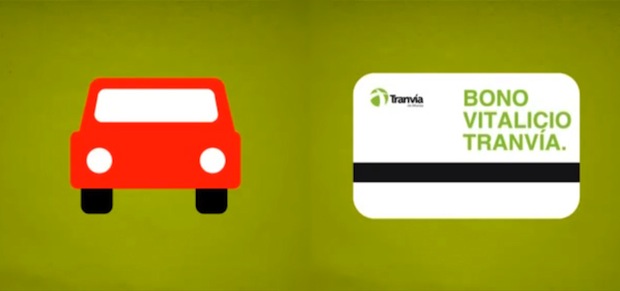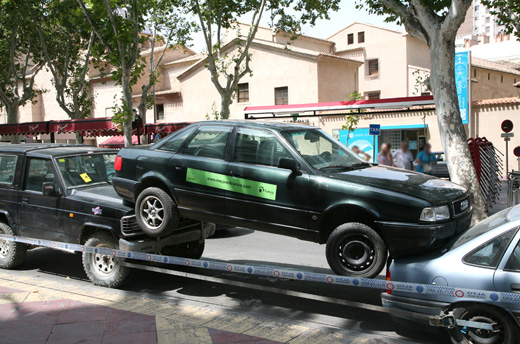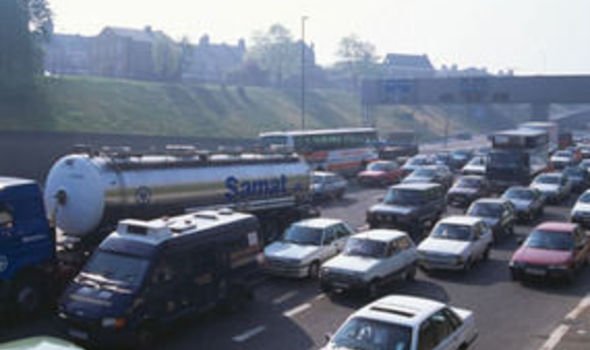Frank Fisher*, 17.02.2011.
If anything needs the critical light of review it is urban transport. In the light of a possible Baillieu/Mulder review of urban commuting, here are a few thoughts on cars an public transport.
1 The majority transport or DODO: Driver Only Driver
Owned urban commuter car.
Other than public transport ticketing, which i address below, there are few things as uneconomic as the DODO. Currently DODOs work at less than 1% efficiency. For every 100 litre of petrol less than one litre actually shifts the driver; 99litres+ moves the car and enables its necessary infrastructure. The average engine converts petrol to motion at something like 15%. But no one drives engines, we drive cars. Cars are roughly 15 times heavier than the average driver, so a driver-in-a-car moves at 1% efficiency. However, a car takes a lot of energy to make, deliver to its driver and maintain over its life, some say as much as half the energy in the fuel it uses in its life! Further, it takes energy to scrap and recycle cars and a vast amount to build and maintain the infrastructures that enable cars to move where we want them to. These are roads, government and private support organisations ranging from registration departments to taxation offices, police, insurances, breakdown clubs, hospitals, more insurances, automobile chambers of commerce and so on. So the car’s real efficiency is actually much less than 1% … but no-one cares because a) we’ve paid a lot for our car [Driver Owned] and for putting it on the road and keeping it there and b) petrol’s cheaper than bottled water!
The craziness of this equation doesn’t end there. Owning our private “gutter decoration” [the DODO’s primary occupation] means that we spend many weeks of each year engaged in earning the money to pay for the privilege. Add this time to that actually spent in driving, parking and maintaining your DODO then divide that total into the number of kilometres travelled annually and you’ll find that the average speed attained is much less than that achieved by a combination of bicycle and public transport.
As if this inefficiency were not bad enough Americans and Brazilians compound it by feeding DODOs with biofuels made from human foodstuffs such as corn and sugar. So in addition to using less than 1% of these foods to move drivers, biofuels are themselves produced inefficiently in terms of the fuels etc. required for the farming and refining processes that make them!
Given all this, why one would bother to own one’s own car beats me. Once one’s disowned that generalised vehicle-for-all-purposes one can easily afford to rent the appropriate vehicle for the task and, for urban commuting, the appropriate vehicles are shoes, bicycles and public transport. These three being appropriate for our own health, our city’s health, the planet’s health and the health of our public and private purses. Moreover, there are currently a billion cars on Earth. Most Australians believe that all people deserve the right to live as we do. That means 9 billion cars driving some 20,000 km/year by the time human population tops out. So even if we all switched to little Indian Nanos, three times more efficient than our current auto-fleet we’ll be three times worse off than today – a totally unsustainable option.
2. Ticketless Public Transport.
Even with the prospect of myki working “glitchlessly”, it is not hard to demonstrate that ticketing will not pay for itself for a long time let alone make any contribution to public transport itself. Aside from the fabulous cost of myki and its predecessor [$B3] there are many hidden costs involved with having the public pay public transport fares. I list some of these below but here i’d like to draw attention to some quite unrecognised costs that arise from the deliberate exclusion of our railways’ extensive real-estate assets from the public domain as a result of the necessity to exclude the “in-valid” [those who haven’t paid a fare] from our stations. In addition to the costs of vandalism control and damage restitution, site insecurity for passengers leads to reduced patronage, especially at night. But the most serious losses arise from the site rents foregone by excluding commerce and community activity from nearly all of our metropolitan area’s two hundred railway stations.
Tickets, as the old “Metcard” warning stressed, require public transport users to be “validated” before entering the system. To viscerally impress this requirement upon passengers, we surround our stations with high fences, excluding them from commercial and community use. Unstaffed buildings, often quite handsome, are locked and vandal-proofed. And, as if to say “no station is sacred”, the very open friendliness of pre-myki Southern Cross is now ruined by fences and barriers erected where never intended. Staffed stations themselves are under-utilised; Flinders St. Station being the most notorious example. The associated losses are not simply directly financial, they also manifest as losses to community and personal amenity. Instead of being friendly islands of community, stations have become isolated black holes literally avoided as such by late-night travellers.
Failing totally “free” public transport, an enlivening alternative to the present vacuous, destructive, fare-collection-related employment scheme called myki, is the public transport levy [PTL].
By collecting an annual Medicare-like PTL from all urban wage-earners, we’d know we’d paid something toward our urban public transport and then be able to use it free of demeaning encumbrances like barriers and ticket inspection. Where machines do the inspection, the demeanment is of concern. To argue against the veracity of machines takes determination and our tacit permission to be tracked financially, and more worryingly spatially, raises questions about the openness of our democracy.
Here is what it could mean:
· public transport free at point of access with all the liberation that would imply.
· shedding some of the taxes that are currently used to pay for public transport.
· public transport free to rural visitors and tourists, just like water. Along with fast and regular rural rail, this would provide an incentive to use rural public transport to commute to the cities.
· a built-in incentive for urban residents to use public transport – annual payment would remind us that we’d paid and therefore that we may as well use what we’d paid for.
· an improvement in the status of travel on “The Met”. It would no longer be seen as the DODO’s “poor cousin”.
· a dramatic decline in the deaths and injuries from crashes and the many diseases directly attributable to DODO-commuting (in Melbourne some 600 deaths annually).
· a friendly, welcoming system where the stresses associated with requiring a ticket, along with the threats associated with not being able to produce one, were removed.
· removal of favours to those wealthy enough to afford congestion taxes such as city parking fees [usually paid for by others] and fines. Thereby, avoidance of the resentment such favours generate.
· the usual Medicare-like support for people for whom the levy would be an excessive burden.
· removal of barriers to the poor to use public transport.
· the “disarming” of the public transport system [as already outlined] with transit assistants replacing “fare police” and the return of the space & vacant buildings around railway platforms to commerce and the community.
· a welcoming and attractive system, partly arising from the greater density of users that a ticketless system would bring!
· removal of the threat to monitor citizens’ movements by tracking us through myki.
· enhanced participation rates. These would provide the political constituency for dramatically improving the current carrying capacities of our metropolitan transit. Relieving rail-congestion is, at least in the long run, so much cheaper and healthier than relieving road-congestion. Consider the neglected costs of making good the planetary damage caused by global warming and the many other negative pollution and land degradation effects of DODO commuting. Currently these are not priced and go unpaid by present generations.
· a more open and equitable system in which payment for the system was overt rather than covert as at present where real payment of public transport comes from consolidated revenues. An annual PTL bill could indicate the proportion of the total cost of metro-transit that the levy actually covered.
For all this it must be recognised that dramatically increasing the capacity of our urban rail systems is no small feat. It will cost billions, take time and create substantial public disruption. Indeed, an argument against the PTL is precisely the government’s fear of overloading the current system! For all that, we live in a representative democracy and the government requires constituency before it acts, so overloading the system is in a sense the only language it can hear.
One of the most valuable implications of a PTL and a dramatic improvement in public transport availability would be the support that it would give to Melbourne’s best kept secret: the effectiveness of the bicycle-rail collaboration. Long ago, Alan Parker pointed out that the fastest, cheapest, healthiest and most sustainable way to get around much of the Melbourne Metro Area was [and today still is] a combination of bicycle and rail. I.e. bicycle to and from rail. It requires improved bike parking facilities at stations and an improved capacity to carry bikes on trains. With bike-rail, Melbourne becomes translucent. No peak hour traffic jams, no parking problems, no need for fuel and maintenance, no depreciation on the car, no speeding fines and, most of all, two to three times faster than the DODO because there’s no time wasted earning the money to pay for it, to park it or to service it!
* Professor, Faculty of Design & National Centre for
Sustainability, Swinburne University of Technology.
















Comments
For anyone visiting Launceston, the Tiger Bus service currently operates 7 days a week across the city centre.
Full info at: http://www.launceston.tas.gov.au/upfiles/lcc/cont/publications/brochures_and_booklets/7595_tiger_bus_brochure_update_2.pdf
The Willoughby council runs a loop service around Artarmon (runs Monday to Friday – see http://bit.ly/oRLuUh) and others around the Chatswood area on different days (see http://bit.ly/nmjLgD).